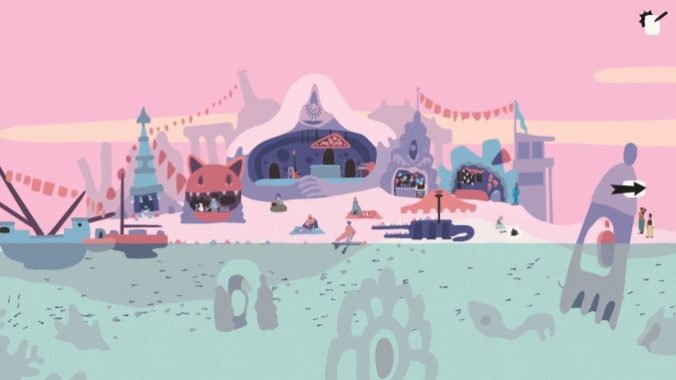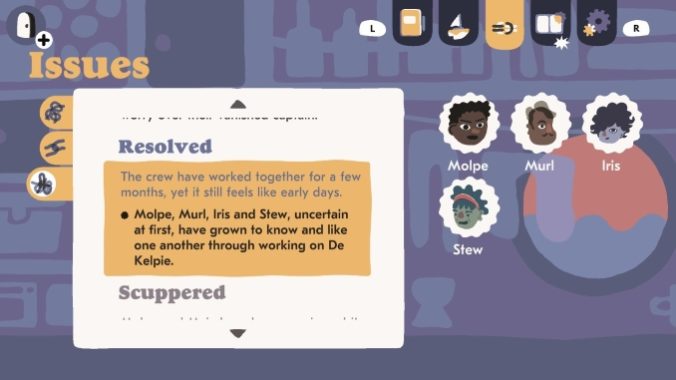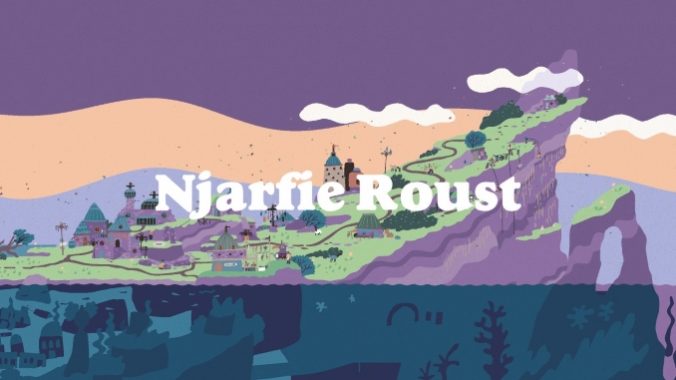
Last weekend, when I played the majority of Saltsea Chronicles, I was talking with a friend about Ursula K. Le Guin, who I recently learned was an anarchist. Or maybe I’d been thinking of her even before our conversation, because all of Saltsea Chronicles, the newest game from studio Die Gute Fabrik, resonates with the most famous line from her anarchist utopian novel The Dispossessed: “Free your mind of the idea of deserving, the idea of earning, and you will begin to be able to think.”
In searching for that quote I found its immediate precedent, which I’d never heard in full: “For we each of us deserve everything, every luxury that was ever piled in the tombs of the dead kings, and we each of us deserve nothing, not a mouthful of bread in hunger. Have we not eaten while another starved? Will you punish us for that? Will you reward us for the virtue of starving while others ate? No man earns punishment, no man earns reward.”
Later on in Saltsea Chronicles you participate in solving a crime. Without getting too specific, the way the crime is solved addresses questions about the efficacy of punishment that you could also find in writing on prison abolition. On another occasion, you encounter a murderer who is in the process of rehabilitation. This moment is an engagement with a philosophy many people believe seriously, which I believe as well: that people have enormous capacity for change and that that capacity must be protected. This framework makes one of your characters very angry, and she rejects that idea, though not completely. Here the game asks itself, and clearly the writers have asked themselves: what would realistically happen if a skeptic, or even a victim, encountered such a system of reparative justice?
Saltsea Chronicles puts such questions front and center throughout its dozen or so hours. You control a crew of characters living in a flooded world which people rebuilt after a catastrophe into a non-hierarchical, collectivist society. When your captain disappears under mysterious circumstances you assemble the crew to try and find her, crossing a dozen islands in the process. You navigate through those islands via point-and-click, getting more information about the world through conversations and observations.
The disappearance of your captain, a remnant of old hierarchies, introduces a unique mechanic of the game. You control the group, not individuals, meaning that every dialogue choice requires you to choose (between two options) who will speak and what they’ll say. Decisions are made together, ideally with everyone’s input, and while you as the player still make most of them, even that’s not always true.

The characters are well-written, from a quiet teenage radio technician to an elderly ship’s cook and sea diver, and I liked them immediately. Their rapport with each other is the basis for another aspect of the game’s relationship mechanics, the “issues” system, where your responses will cause characters to have conflicts with each other. These issues can’t always be resolved, but when they can it’s satisfying to see the characters recommit to each other.
Although you control them all, the characters’ choices are distinct from yours. The crew discuss decisions and sometimes dismiss them because they’re unethical. Sometimes they make the decision together without your input. The studio has really succeeded in making it feel like you’re playing as a group of people. The conceit is so strong that it absorbs everything else into it: working together as equals isn’t just the mechanism for the game, but the philosophy its world and cultures are centered around. Collaboration is a treasured value, and the world building succeeds at communicating that through little interactions, like when a trader gives you a bundle of flowers just because it made one of your characters smile.
There is a ton of content in this game, though I struggle even describing it as such– it feels too precious, and each island feels so necessary to the story that I struggle to believe I only saw slightly over half of them. Me, who never replays games, is already thinking of going through a second time and making different choices.
By far the most enigmatic part of the game, besides the writing, is the visuals. Similarly to Mutazione, the studio’s fifth game, characters and backgrounds are constructed in a blobby, brightly colored style. Exterior environments were a particular highlight, including crowded bazaars made of connected ships and rocky cliffside villages. But the interiors are beautiful too, especially the cozy inside of your ship, De Kelpie. I clicked on every icon I could find both to learn more about the story and to spend more time within the scenes.

In its portrayal of a society based on mutual entanglement, Saltsea Chronicles resists the temptation to sever this beautifully drawn post-disaster world from reality and make it pure fantasy. Instead, mentions of the world before— our world, it turns out– drip through. I never found Le Guin in Saltsea Chronicles, though maybe she’s in there somewhere. But throughout it echoed the philosophies of anarchist and socialist thinkers, as well as existing and pre existing collectivist societies. In linking the Saltsea archipelago to our world while also making it meaningfully distinct, the game resists becoming an allegory and becomes a story in and of itself. It extends beyond being a mirror for contemporary society and instead becomes an illustration of an alternate path forward, another way we could approach the same issues of climate change and environmental devastation that make up the characters’ pasts and presents.
In the same vein, Saltsea Chronicles is interested in the injustices that arise when you attempt to construct a wholly non-hierarchical society. It chooses not to structure post-Flood Saltsea as a perfect utopia, instead noting repeatedly and often the ways it fails. In my time with the game this was what impressed me the most: its commitment to realistically presenting the challenges that would be present in a society that’s nominally about fairness and mutual input. People get greedy and claim power anyway, people leverage non-hierarchy to be in control. And less maliciously, people are forced into a controlling role despite their wishes, because of other people’s expectations and desires.
But treating something seriously is the first step toward saying it’s possible. Treating the idea of non-hierarchical organization seriously here means investigating the ways it could be misused, and this means engaging with it more deeply. It also allows characters space to be wrong and to admit, later, that their minds have changed, another aspect of the reparative framework I mentioned earlier. This is part of what makes the characters feel so great. They aren’t collections of traits, but individuals who are affected by the beliefs of others and learn from them.
There’s a lot I haven’t even found room to say yet. My praise is effusive enough that it becomes kind of random: the accessibility sliders, for example, look beautiful (and of course their presence is appreciated). There’s a sticker book (that acts like an achievement system) which I love. My criticisms are, conversely, small: I don’t like playing Spoils that much, but I can’t be too mad that the optional card game feels somewhat cheap. There are conversations with crew members who get less screen time that could have used more depth. The writing on the whole, though, is excellent, and I laughed aloud more than once.
Saltsea Chronicles, put more simply, is triumphant. It’s up there (amongst very tough competition) for the best game I played this year. I found its measured and realistic portrait of the collectivist society it portrays extremely hopeful. It pushes the medium forward, as cliche as that may be to say, in its insistence on theorizing the specifics of a social and political philosophy to its conclusion.
In closing, I’ll suggest you play this game in episodes. An island a night, or, if you can’t help it, play it like I did over a rainy weekend all at once. But do play it, and give yourself the favor of experiencing its nuanced portrait of a better world.
Saltsea Chronicles was developed and published by Die Gute Fabrik. Our review is based on the Nintendo Switch version. It is also available on PS5 and PC.
Emily Price is a former intern at Paste and a columnist at Unwinnable Magazine. She is also a PhD Candidate in literature at the CUNY Graduate Center. She can be found on Twitter @the_emilyap.